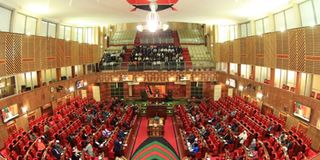Enact two-thirds gender rule before referendum

What you need to know:
- Parliament accused of refusing to enact enabling legislation in keeping to Article 81 on the two-thirds gender rule and matters concerning People Living with Disabilities.
- Women need to be given what the Constitution highlights and nothing short.
- No reason to discuss constitutional review with an unconstitutional Parliament and Cabinet.
- Ten years after the current Constitution was effected, little has changed on gender equality.
A section of rights groups and gender activists have revived the implementation of the elusive two-thirds gender debate.
A webinar organised by Konrad-Adenauer-Stiftung-Kenya office titled women’s participation and representation in politics and dubbed # RethinkingDemocracy lifted the lid on the frustrations women continue to experience over the failure to implement the two-thirds gender rule.
Community Advocacy and Awareness (Crawn) Trustexecutive director Daisy Amdany accused Parliament of “playing games and refusing to enact enabling legislation in keeping to Article 81 on the two-thirds gender rule and matters concerning People Living with Disabilities”.
“We have the Constitution but lack the political will. Let us not chase other things when we have not gotten what is already provided for in the Constitution of Kenya. Women need to be given what the Constitution highlights and nothing short,” she said.
Ms Amdany added that there is need to galvanise more women around issues affecting women and not just political issues.
“Consistency is key. We are mobilising more women to defend their constitutional gains. Women need to have agendas and avoid being carried away by other people’s agendas. We should not be chasing after other things when we have not got our portion from the Constitution 2010,” she said.
APPOINTIVE POSITIONS
Article 27 of the Constitution proscribes gender discrimination, provides for equality in the family, protection of the inheritance rights of spouses, protection of the rights of women to the matrimonial home and gender equality in all elective and appointive positions.
However, almost ten years since the current Constitution came into effect, the gender composition of public bodies has never been fully implemented and there is currently no clear direction in sight from the government on how the issue will be resolved.
The Gender Bill remains a mirage despite three attempts to have Parliament pass it.
As a result, the gender rule has remained elusive in the National Assembly a body which have been accused of dragging its feet in enacting the requisite laws to ensure it is achieved.
Marilyn Kamuru, a feminist, said there is no reason to discuss any referendum or constitutional review with an unconstitutional Parliament and Cabinet.
“We should not have a third election without a compliant and constitutional parliament and Independent Electoral and Boundaries Commission (IEBC),” she said.
However, Women in Leadership Kenya, a platform for women in leadership observed that 2022 will be significant as it will mean achieving what women have in the Constitution (two thirds-gender rule) or losing it all.
The organisation said women or any other gender should not be begging for the implementation of the two-thirds gender rule as it is in the Constitution.
Helena Kithinji, a participant during the webinar, said it is sad that ten years after the current Constitution was effected, little has changed in matters to do with gender equality.
She said the patriarchal system is to blame terming it as unjust and therefore needed to be dismantled to achieve gender equality.
POLITICAL OWNERSHIP
According to United Nations Conference on Trade and Development (Unctad) increasing concerns among policymakers and development practitioners indicate that gender inequality pose not only moral challenge, but a drag on economic growth.
Crawn Trust observed the need to reduce gender gaps by ensuring access to economic resources and opportunities, increasing women’s participation in decision-making processes; and reducing inequalities thus eliminating discrimination through the advancement of the rights of women and girls.
“Gender equity is not only a women’s issue. Both men and women must be involved in advancing policies and discussions around gender equality,” the organisation observed.
The organisation called for the transformation of the country’s political parties to become ideological vehicles and not ethical groupings which had made it difficult for women to wave through political ownership.
Priscilla Nyokabi, a commissioner at the National Gender and Equality Commission said participation of women in politics and high levels of decision making is critical for the country’s development.
She added both men and women are important in achieving gender equality in the country.
Lately, there has been spirited efforts to hold a referendum to pass proposals contained in the Bridging Bridges Initiative.





